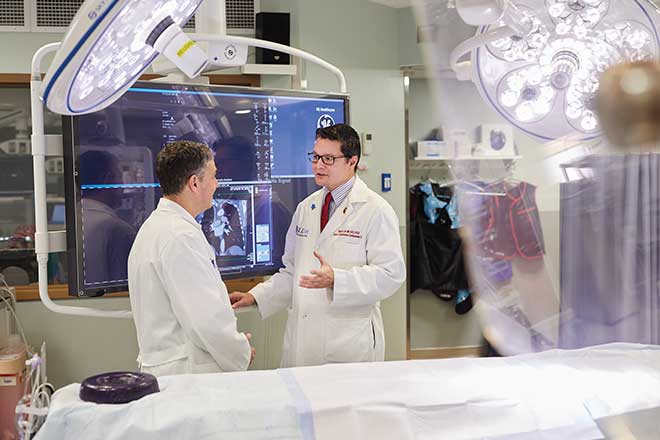A recent partnership formed between SLUCare Physician Group and SSM Health St. Louis is changing the face of health care for the St. Louis region in a positive way. “With this partnership, we are able to give our patients every single new technology with excellent results,” says Dr. Richard Lee, SLUCare cardiovascular surgeon and co-director of the Center for Comprehensive Cardiovascular Care. Not only that, Lee explains, but it also allows for a seamless pathway of care when it comes to referrals and communication between doctors. “It’s better for the patient if a system can offer a comprehensive package of services across systems,” he says.
Just one of the fields benefiting from this joining of forces is cardiovascular care, and SLUCare cardiologist Dr. Michael Lim, who co-directs the Center for Comprehensive Cardiovascular Care, says it’s a particularly exciting time in heart medicine. “It used to be that surgical options for heart failure [the insufficient pumping of blood to supply the body] meant open-heart surgery. But less-invasive, percutaneous methods have evolved over the past few years and are becoming much more commonplace.”
Percutaneous procedures, explains Lim, are those done through small tubes placed into arteries or veins via needle punctures in the skin. Transcatheter Aortic Valve Replacement (TAVR) is one example of this: “Where once, replacing the [aortic] valve meant stopping the heart and involved a lot of cutting and sewing, now we can give a patient a brand new valve through the skin, and the heart never even has to stop beating,” Lim says.
Sometimes, however, a valve needs only to be repaired. Mitral regurgitation—the most common type of heart valve disorder—occurs when the leaflets or ‘double doors’ in the mitral valve don’t close properly, allowing blood to leak backward in your heart. The mitral valve lies between the heart’s left atrium and left ventricle, Lee explains, and its leaflets open and close as the heart beats. Normally, when open, blood flows through from the heart’s upper chamber into the lower chamber. When the heart contracts, the valve closes. With mitral valve malfunction, there’s a problem of leakage, and a MitraClip is inserted via catheter through a vein in the leg and into the heart, where it ‘clips’ and tightens the valve, preventing back flow.
“It can work fabulously,” Lee says, adding that it is especially suited to very sick people who may not be good candidates for open heart surgery. “We still operate on those who can undergo an operation safely, but for sicker, higher-risk patients, the percutaneous option is a really good one.” Lee says since the MitraClip was approved two years ago, he has performed more than 50 such procedures. “We were one of the first sites in the country to offer it outside of trial,” he notes.
Thanks to the partnership between SLUCare and SSM Health St. Louis, Lim and Lee have a new colleague who brings his vascular skills to the table, as well. Dr. Anish Thomas is an interventional cardiologist with SSM Heart & Vascular Care, who, later this month will launch a clinic for peripheral vascular disease (PVD) with other SLUCare physicians in the SLUCare Physician Group’s University Tower in Brentwood.
PVD is a common circulatory problem in which peripheral arteries (which carry blood to limbs, organs and the head) become narrowed by plaque, reducing blood flow. Although surgical bypass once was the only option for getting around blockages, now tiny instruments for ballooning and stenting arteries can be inserted via catheter through small punctures in the skin. (In severe cases, the instruments can even be used to drill plaque away.)
Lee says there are other benefits to this expanded partnership, as well. “Not only do more patients mean we are performing complex procedures more frequently, but our higher numbers allow us to qualify to take part in more clinical trials,” he explains. One such trial is for another kind of minimally invasive valve replacement that uses the Tendyne valve. Unlike the MitraClip, which repairs the mitral valve, this Tendyne device replaces it altogether through a small incision in the chest. Saint Louis University School of Medicine is among select institutions in the country to get approval for studying the implant, Lee says. Procedures are performed at SSM Health Saint Louis University Hospital.
“I believe that in the near future we will be able to replace nearly all valves with a mere poke in the vein,” Lee says. “These are exciting times, and with this partnership, we can offer even more services than we did before.”
SSM Health and SLUCare providers collaborate to bring high-quality care to patients. Pictured on the cover: Dr. Anish Thomas, SSM Health Medical Group cardiologist; Dr. Michael Lim, SLUCare cardiologist; Dr. Dawn Hui and Dr. Richard Lee, SLUCare cardiothoracic surgeons; Dr. David Theodoro, SSM Health Medical Group cardiothoracic surgeon. For more information, call 314.977.4440 or visit slucare.edu/heart.
Cover design by Allie Bronsky | Cover photo courtesy of SLUCare
